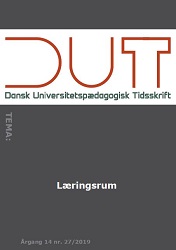Sensing the Same Space – Spatial Understanding and Engagement in Higher Education
DOI:
https://doi.org/10.7146/dut.v14i27.112640Abstract
The aim of this theoretically oriented review is to examine the role of space and spatial thinking in the changing teaching and learning environments in higher education. The starting point is that educational space is not a pre-set institution or only a physical space but a social construction. As such, space is a crucial element in the learning process and student engagement.
In the paper, basic concepts of educational space and spatiality are discussed. The complexity of the relations between spatial understanding and student engagement is demonstrated by referring to a specific drama and theatre course as a case example. The case was a joint master-level course between two European universities (in UK and Finland) where multiple online platforms were used.
By the means of the learning space in the case, we discuss the nexus of spaces, comprising a dynamic spatial plurality across the learning environments. Blurring boundaries between formal and informal spaces seems to give room for meaningful and embodied experiences - social, situational and emotional connectedness with students in different places. Formal ICT solutions of digital learning do not automatically pay enough attention to spatial aspects of learning and engagement. Understanding the connections between spatial thinking and the meanings of engagement and senses of belonging brings vital elements to the development of digital learning and learning environments. Parallel with the discussions of the distinctive role of interaction and communication in digital environments, spatial understanding can offer an important contribution to increase understanding of personal meanings of learning. Based on the theoretical reflections of the presented case, bodily experiences of the sense of “sharing a space” appears to interrelate with the feelings of belonging and ownership in learning.
Downloads
Published
How to Cite
Issue
Section
License
DUT udkommer elektronisk via Statsbibliotekets Open Journal System (Tidsskrift.dk) og DUNs hjemmeside (DUN-net.dk) forår og efterår. Det er gratis og frit tilgængeligt at læse og downloade artikler fra tidsskriftet.
Det er ikke muligt at abonnere på Dansk Universitetspædagogisk Tidsskrift, DUT, men hvis du er medlem af DUN, får du tilsendt en nyhedsmail med link til udgivelsen, når den nyeste udgave er online. Linket vil også være tilgængeligt her på siden, så snart tidsskriftet er publiceret.
© Copyright
Artikler publiseret i Dansk Universitetspædagogisk Tidsskrift, DUT, må bruges (downloades) og genbruges (distribueres, kopieres, citeres) til ikke-kommercielle formål med reference til forfattere og Dansk Universitetspædagogisk Tidsskrift.
Artikler indsendt til Dansk Universitetspædagogisk Tidsskrift må ikke publiseres i andre tidskrifter.
Betingelser
Artikler i Dansk Universitetspædagogisk Tidsskrift, DUT, er omfattet af ophavsretsloven, og der må citeres fra dem.
Følgende betingelser skal dog være opfyldt:
- Citatet skal være i overensstemmelse med „god skik“
- Der må kun citeres „i det omfang, som betinges af formålet“
- Ophavsmanden til teksten skal krediteres, og kilden skal angives ift. ovenstående bibliografiske oplysninger.





